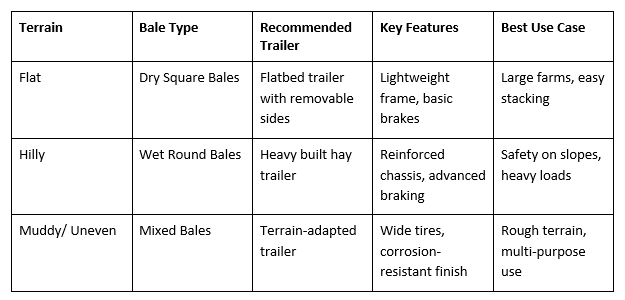
Selecting the ideal bale hay trailer for your farm isn’t just about size; it’s about matching your land’s terrain and bale types with the trailer’s features. Whether you manage flat, hilly, or muddy ground, or haul round versus square bales, your trailer choice impacts productivity and safety.
Are you aware how a trailer built for dry bales might struggle with wet loads? Or how terrain-adapted trailers improve hauling on tough ground? Let’s dive into how your land and load dictate the perfect trailer, and why custom options from a trusted 14-bale hay trailer manufacturer or a heavy built hay trailer provider could be the smart move.
The terrain you operate on heavily influences the trailer design you need:
• Flat Terrain: Lightweight trailers with basic suspension and simple brake systems are usually sufficient.
• Hilly Terrain: Requires trailers equipped with advanced braking systems, stronger chassis, and adjustable axle setups for stability.
• Muddy or Uneven Terrain: Needs terrain-adapted trailers featuring wider tires, corrosion-resistant materials, and reinforced frames for durability.
Choosing the right terrain-adapted bale hay trailer is key to efficient agricultural hauling. Ignoring this could cost you in trailer damage and downtime.
Load type matters just as much as terrain:
• Round vs. Square Bales: Round bale trailers typically have stakes or cages, while square bale trailers are often flatbeds with racks or removable sides.
• Wet vs. Dry Bales: Wet bales add significant weight and moisture, demanding trailers with higher hay trailer load capacity and corrosion-resistant finishes.
According to the USDA Agricultural Equipment Report 2024, farms using customized trailers experience 20% less operational downtime—a compelling reason to match your trailer to your load type.
If standard trailers don’t meet your exact needs, customization is essential. Adjustable features such as modular decks, removable panels, and adaptable axles allow your trailer to fit changing conditions.
Denning Machine Shop Inc specializes in welding, machine work, shear & brake operations, and parts manufacturing—providing terrain-specific and load-optimized custom hay trailer options. Our fabrication expertise ensures your trailer delivers long-lasting performance and meets your farm’s unique requirements.

What happens when your land doesn’t fit neatly into these categories? Custom bale hay trailers can adapt exactly to your terrain and bale types—making your operations safer and more productive.
If your operation demands hauling heavy, wet bales over challenging terrain, a heavy built hay trailer is a must. Such trailers feature high-grade steel construction, precision welding, and specialized components built to withstand stress and corrosion.
With superior shear & brake operations and machine work, these trailers reduce breakdowns and maintenance costs. This translates into reliable hauling season after season.
Ask yourself:
• Does the trailer integrate smoothly with your existing farm equipment?
• Are upgrades or adjustments possible for future needs?
• How will the trailer affect hauling efficiency and fuel consumption?
Choosing a bale hay trailer without these considerations can lead to frustration and financial loss. Select a model designed for your unique operation to maximize your investment.
Navigating the range of trailers available can be confusing. Partnering with a professional service provider that offers custom fabrication, welding, and machining ensures you get the right trailer the first time.
The latest innovations in agricultural hauling equipment include terrain-adapted and modular hay trailers designed for enhanced efficiency. Trusting a 14-bale hay trailer manufacturer with expertise in custom builds guarantees a product perfectly suited to your farm.
1. What is the difference between round and square bale trailers?
Round bale trailers use stakes or cages to secure the load, while square bale trailers use flatbeds with racks. The choice depends on your bale type and handling needs.
2. How does moisture content affect trailer selection?
Wet bales are heavier and can cause corrosion, requiring trailers with higher load capacity and corrosion-resistant materials.
3. Can trailers be customized for different terrains?
Absolutely. Custom fabrication allows trailers to be equipped with adjustable axles, wider tires, and reinforced frames for flat, hilly, or muddy conditions.
4. Why are advanced brakes important for hilly land?
Advanced braking systems ensure safety and control on slopes, preventing accidents and load shifts during transport.
5. How can Denning Machine Shop Inc help with my hay trailer needs?
Denning offers expert welding, machine work, shear & brake operations, and custom parts manufacturing to create trailers tailored to your land and load requirements.
When it comes to choosing the right bale hay trailer, don’t settle for generic solutions. Consider your terrain and bale type carefully, and explore custom options offered by trusted providers like Denning Machine Shop Inc. Our hay trailer sales records will showcase to you how precision-built and terrain-adapted trailers ensure utmost efficiency.
Stay tuned—innovations in trailer design could transform your hauling operation sooner than expected!